Sociology Research Paper: Socialization, Interaction and Society
VerifiedAdded on 2023/05/31
|9
|1913
|286
Essay
AI Summary
This research paper delves into the core sociological concepts of socialization and social interaction, defining them as processes through which individuals adapt to society and learn accepted behaviors. It examines the key agents of socialization, including family, peer groups, mass media, religion, and schools, highlighting their influence on shaping individuals' values, beliefs, and behaviors. The paper explores the importance of socialization and social interaction, emphasizing their crucial role in individual development, societal functioning, and economic growth. It also discusses how these processes affect an individual's understanding of norms, interests, and desires, enabling them to function within groups and society at large. The paper concludes by emphasizing the need for positive self-image and emotional fulfillment, as well as the importance of human interaction for mental development and learning.

Running head: SOCIOLOGY 1
Sociology
Name
Institution
Sociology
Name
Institution
Paraphrase This Document
Need a fresh take? Get an instant paraphrase of this document with our AI Paraphraser
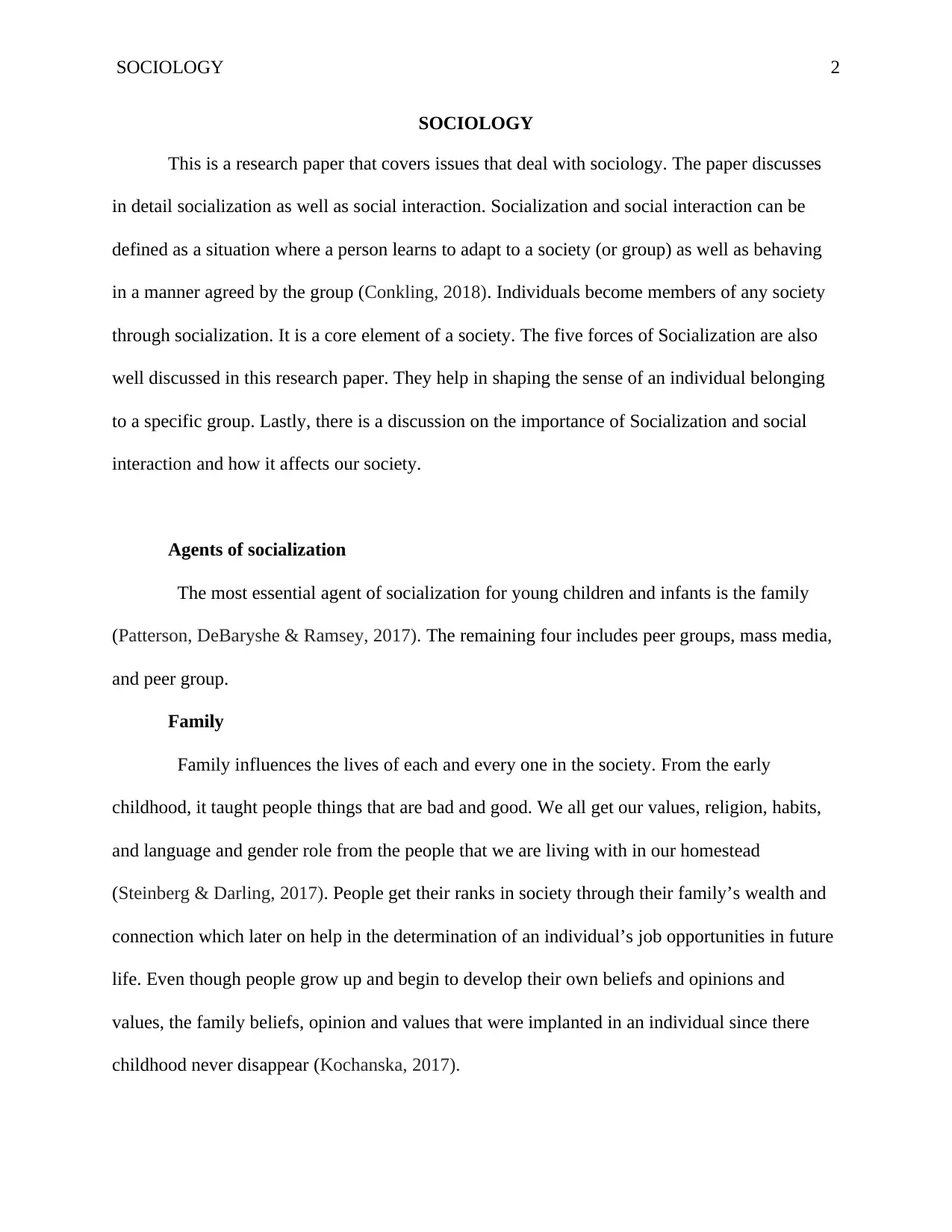
SOCIOLOGY 2
SOCIOLOGY
This is a research paper that covers issues that deal with sociology. The paper discusses
in detail socialization as well as social interaction. Socialization and social interaction can be
defined as a situation where a person learns to adapt to a society (or group) as well as behaving
in a manner agreed by the group (Conkling, 2018). Individuals become members of any society
through socialization. It is a core element of a society. The five forces of Socialization are also
well discussed in this research paper. They help in shaping the sense of an individual belonging
to a specific group. Lastly, there is a discussion on the importance of Socialization and social
interaction and how it affects our society.
Agents of socialization
The most essential agent of socialization for young children and infants is the family
(Patterson, DeBaryshe & Ramsey, 2017). The remaining four includes peer groups, mass media,
and peer group.
Family
Family influences the lives of each and every one in the society. From the early
childhood, it taught people things that are bad and good. We all get our values, religion, habits,
and language and gender role from the people that we are living with in our homestead
(Steinberg & Darling, 2017). People get their ranks in society through their family’s wealth and
connection which later on help in the determination of an individual’s job opportunities in future
life. Even though people grow up and begin to develop their own beliefs and opinions and
values, the family beliefs, opinion and values that were implanted in an individual since there
childhood never disappear (Kochanska, 2017).
SOCIOLOGY
This is a research paper that covers issues that deal with sociology. The paper discusses
in detail socialization as well as social interaction. Socialization and social interaction can be
defined as a situation where a person learns to adapt to a society (or group) as well as behaving
in a manner agreed by the group (Conkling, 2018). Individuals become members of any society
through socialization. It is a core element of a society. The five forces of Socialization are also
well discussed in this research paper. They help in shaping the sense of an individual belonging
to a specific group. Lastly, there is a discussion on the importance of Socialization and social
interaction and how it affects our society.
Agents of socialization
The most essential agent of socialization for young children and infants is the family
(Patterson, DeBaryshe & Ramsey, 2017). The remaining four includes peer groups, mass media,
and peer group.
Family
Family influences the lives of each and every one in the society. From the early
childhood, it taught people things that are bad and good. We all get our values, religion, habits,
and language and gender role from the people that we are living with in our homestead
(Steinberg & Darling, 2017). People get their ranks in society through their family’s wealth and
connection which later on help in the determination of an individual’s job opportunities in future
life. Even though people grow up and begin to develop their own beliefs and opinions and
values, the family beliefs, opinion and values that were implanted in an individual since there
childhood never disappear (Kochanska, 2017).
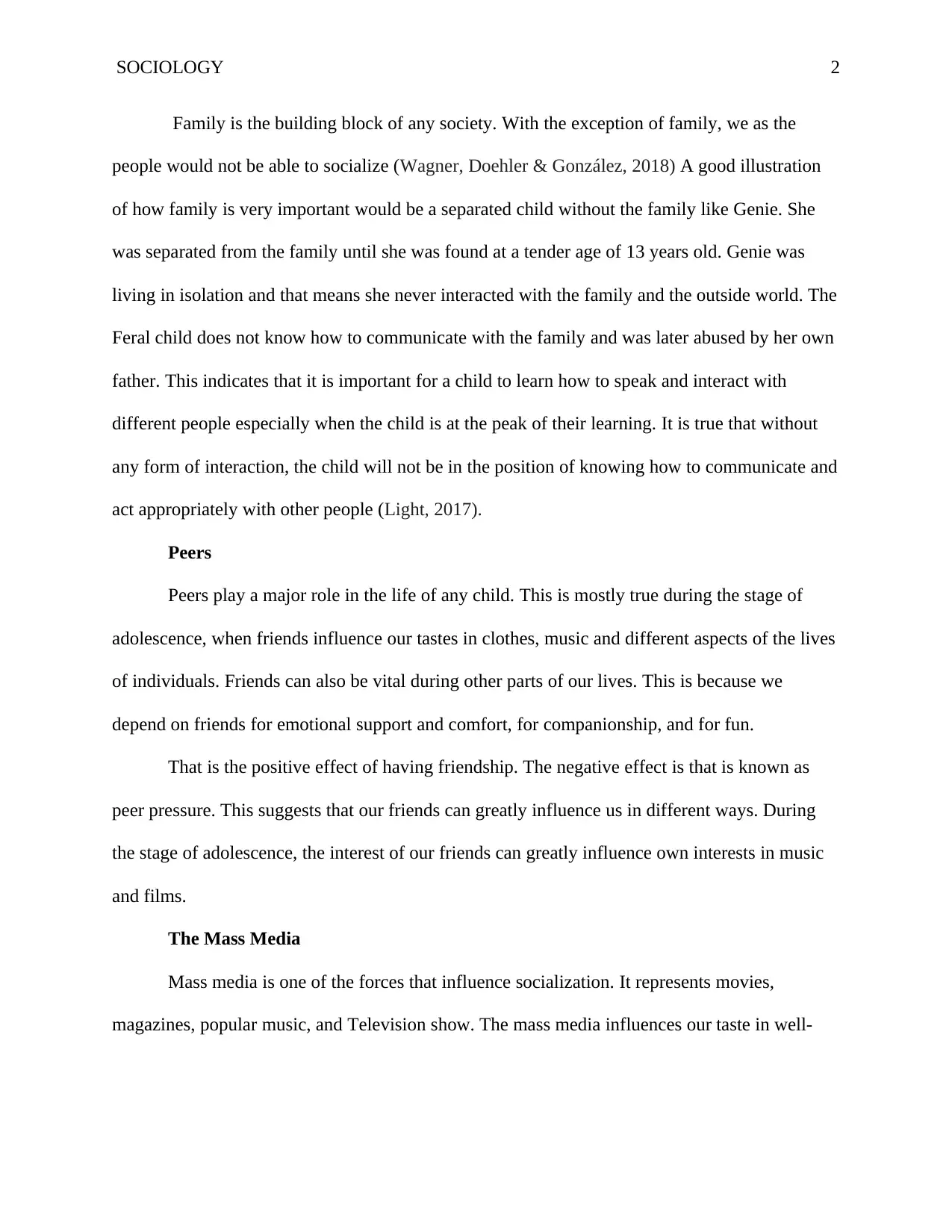
SOCIOLOGY 2
Family is the building block of any society. With the exception of family, we as the
people would not be able to socialize (Wagner, Doehler & González, 2018) A good illustration
of how family is very important would be a separated child without the family like Genie. She
was separated from the family until she was found at a tender age of 13 years old. Genie was
living in isolation and that means she never interacted with the family and the outside world. The
Feral child does not know how to communicate with the family and was later abused by her own
father. This indicates that it is important for a child to learn how to speak and interact with
different people especially when the child is at the peak of their learning. It is true that without
any form of interaction, the child will not be in the position of knowing how to communicate and
act appropriately with other people (Light, 2017).
Peers
Peers play a major role in the life of any child. This is mostly true during the stage of
adolescence, when friends influence our tastes in clothes, music and different aspects of the lives
of individuals. Friends can also be vital during other parts of our lives. This is because we
depend on friends for emotional support and comfort, for companionship, and for fun.
That is the positive effect of having friendship. The negative effect is that is known as
peer pressure. This suggests that our friends can greatly influence us in different ways. During
the stage of adolescence, the interest of our friends can greatly influence own interests in music
and films.
The Mass Media
Mass media is one of the forces that influence socialization. It represents movies,
magazines, popular music, and Television show. The mass media influences our taste in well-
Family is the building block of any society. With the exception of family, we as the
people would not be able to socialize (Wagner, Doehler & González, 2018) A good illustration
of how family is very important would be a separated child without the family like Genie. She
was separated from the family until she was found at a tender age of 13 years old. Genie was
living in isolation and that means she never interacted with the family and the outside world. The
Feral child does not know how to communicate with the family and was later abused by her own
father. This indicates that it is important for a child to learn how to speak and interact with
different people especially when the child is at the peak of their learning. It is true that without
any form of interaction, the child will not be in the position of knowing how to communicate and
act appropriately with other people (Light, 2017).
Peers
Peers play a major role in the life of any child. This is mostly true during the stage of
adolescence, when friends influence our tastes in clothes, music and different aspects of the lives
of individuals. Friends can also be vital during other parts of our lives. This is because we
depend on friends for emotional support and comfort, for companionship, and for fun.
That is the positive effect of having friendship. The negative effect is that is known as
peer pressure. This suggests that our friends can greatly influence us in different ways. During
the stage of adolescence, the interest of our friends can greatly influence own interests in music
and films.
The Mass Media
Mass media is one of the forces that influence socialization. It represents movies,
magazines, popular music, and Television show. The mass media influences our taste in well-
⊘ This is a preview!⊘
Do you want full access?
Subscribe today to unlock all pages.

Trusted by 1+ million students worldwide
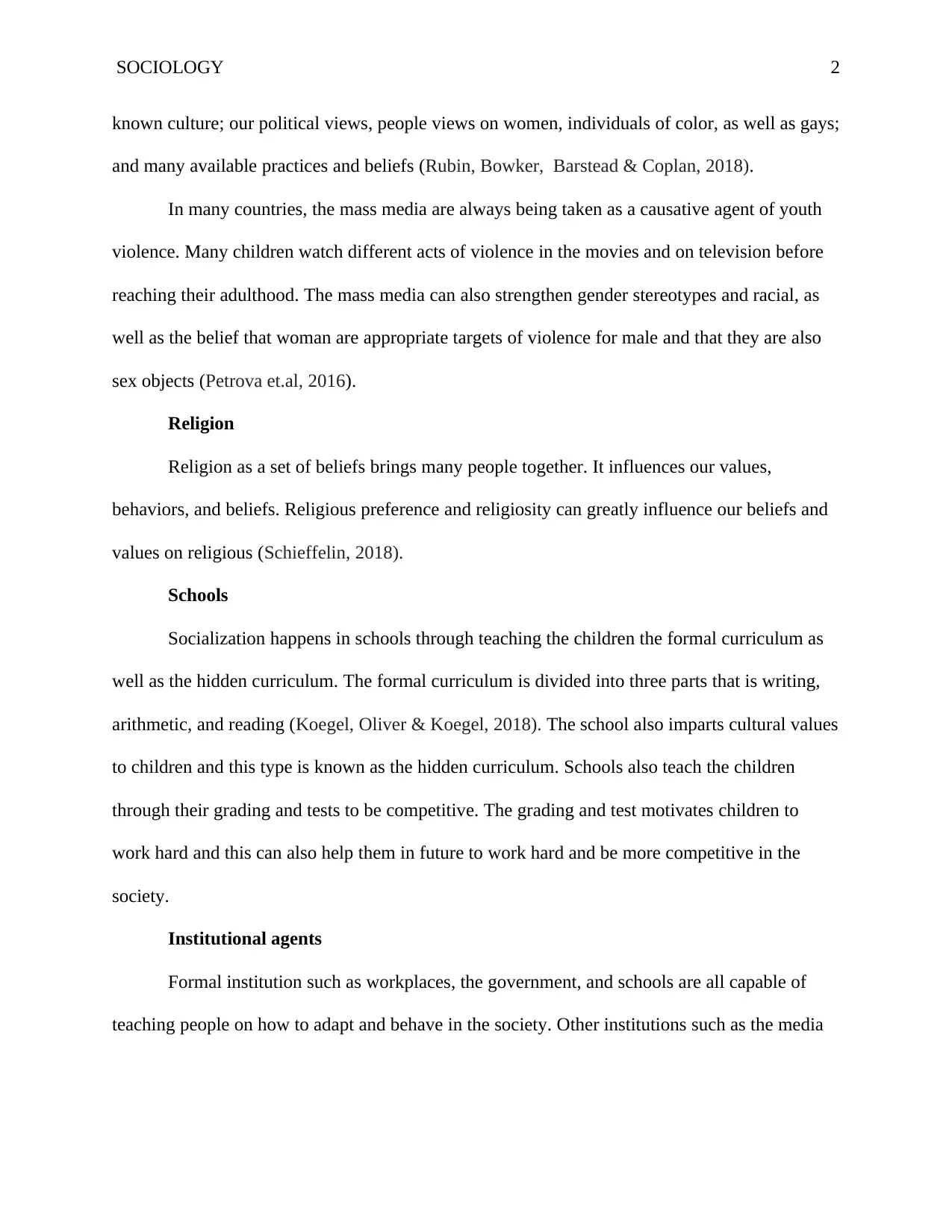
SOCIOLOGY 2
known culture; our political views, people views on women, individuals of color, as well as gays;
and many available practices and beliefs (Rubin, Bowker, Barstead & Coplan, 2018).
In many countries, the mass media are always being taken as a causative agent of youth
violence. Many children watch different acts of violence in the movies and on television before
reaching their adulthood. The mass media can also strengthen gender stereotypes and racial, as
well as the belief that woman are appropriate targets of violence for male and that they are also
sex objects (Petrova et.al, 2016).
Religion
Religion as a set of beliefs brings many people together. It influences our values,
behaviors, and beliefs. Religious preference and religiosity can greatly influence our beliefs and
values on religious (Schieffelin, 2018).
Schools
Socialization happens in schools through teaching the children the formal curriculum as
well as the hidden curriculum. The formal curriculum is divided into three parts that is writing,
arithmetic, and reading (Koegel, Oliver & Koegel, 2018). The school also imparts cultural values
to children and this type is known as the hidden curriculum. Schools also teach the children
through their grading and tests to be competitive. The grading and test motivates children to
work hard and this can also help them in future to work hard and be more competitive in the
society.
Institutional agents
Formal institution such as workplaces, the government, and schools are all capable of
teaching people on how to adapt and behave in the society. Other institutions such as the media
known culture; our political views, people views on women, individuals of color, as well as gays;
and many available practices and beliefs (Rubin, Bowker, Barstead & Coplan, 2018).
In many countries, the mass media are always being taken as a causative agent of youth
violence. Many children watch different acts of violence in the movies and on television before
reaching their adulthood. The mass media can also strengthen gender stereotypes and racial, as
well as the belief that woman are appropriate targets of violence for male and that they are also
sex objects (Petrova et.al, 2016).
Religion
Religion as a set of beliefs brings many people together. It influences our values,
behaviors, and beliefs. Religious preference and religiosity can greatly influence our beliefs and
values on religious (Schieffelin, 2018).
Schools
Socialization happens in schools through teaching the children the formal curriculum as
well as the hidden curriculum. The formal curriculum is divided into three parts that is writing,
arithmetic, and reading (Koegel, Oliver & Koegel, 2018). The school also imparts cultural values
to children and this type is known as the hidden curriculum. Schools also teach the children
through their grading and tests to be competitive. The grading and test motivates children to
work hard and this can also help them in future to work hard and be more competitive in the
society.
Institutional agents
Formal institution such as workplaces, the government, and schools are all capable of
teaching people on how to adapt and behave in the society. Other institutions such as the media
Paraphrase This Document
Need a fresh take? Get an instant paraphrase of this document with our AI Paraphraser
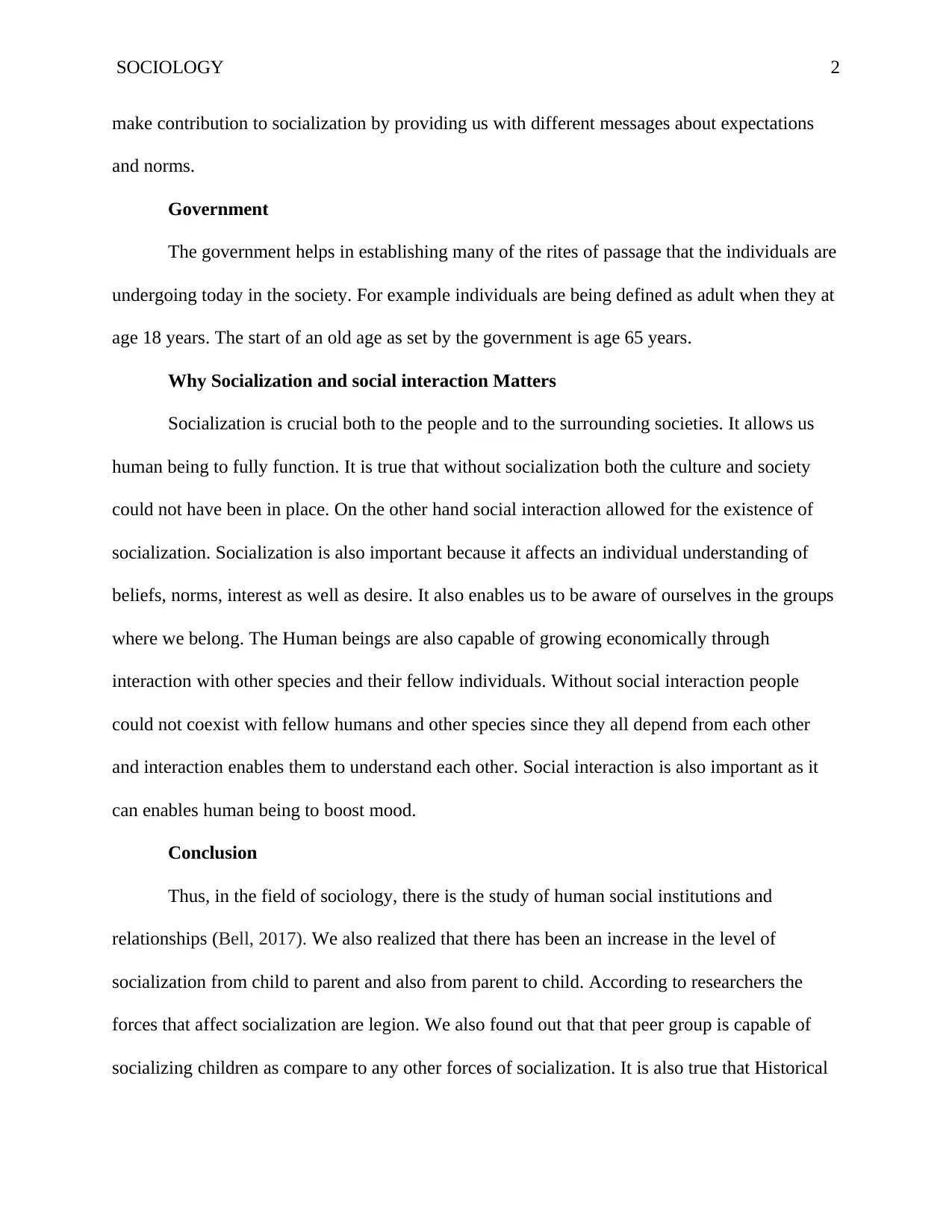
SOCIOLOGY 2
make contribution to socialization by providing us with different messages about expectations
and norms.
Government
The government helps in establishing many of the rites of passage that the individuals are
undergoing today in the society. For example individuals are being defined as adult when they at
age 18 years. The start of an old age as set by the government is age 65 years.
Why Socialization and social interaction Matters
Socialization is crucial both to the people and to the surrounding societies. It allows us
human being to fully function. It is true that without socialization both the culture and society
could not have been in place. On the other hand social interaction allowed for the existence of
socialization. Socialization is also important because it affects an individual understanding of
beliefs, norms, interest as well as desire. It also enables us to be aware of ourselves in the groups
where we belong. The Human beings are also capable of growing economically through
interaction with other species and their fellow individuals. Without social interaction people
could not coexist with fellow humans and other species since they all depend from each other
and interaction enables them to understand each other. Social interaction is also important as it
can enables human being to boost mood.
Conclusion
Thus, in the field of sociology, there is the study of human social institutions and
relationships (Bell, 2017). We also realized that there has been an increase in the level of
socialization from child to parent and also from parent to child. According to researchers the
forces that affect socialization are legion. We also found out that that peer group is capable of
socializing children as compare to any other forces of socialization. It is also true that Historical
make contribution to socialization by providing us with different messages about expectations
and norms.
Government
The government helps in establishing many of the rites of passage that the individuals are
undergoing today in the society. For example individuals are being defined as adult when they at
age 18 years. The start of an old age as set by the government is age 65 years.
Why Socialization and social interaction Matters
Socialization is crucial both to the people and to the surrounding societies. It allows us
human being to fully function. It is true that without socialization both the culture and society
could not have been in place. On the other hand social interaction allowed for the existence of
socialization. Socialization is also important because it affects an individual understanding of
beliefs, norms, interest as well as desire. It also enables us to be aware of ourselves in the groups
where we belong. The Human beings are also capable of growing economically through
interaction with other species and their fellow individuals. Without social interaction people
could not coexist with fellow humans and other species since they all depend from each other
and interaction enables them to understand each other. Social interaction is also important as it
can enables human being to boost mood.
Conclusion
Thus, in the field of sociology, there is the study of human social institutions and
relationships (Bell, 2017). We also realized that there has been an increase in the level of
socialization from child to parent and also from parent to child. According to researchers the
forces that affect socialization are legion. We also found out that that peer group is capable of
socializing children as compare to any other forces of socialization. It is also true that Historical
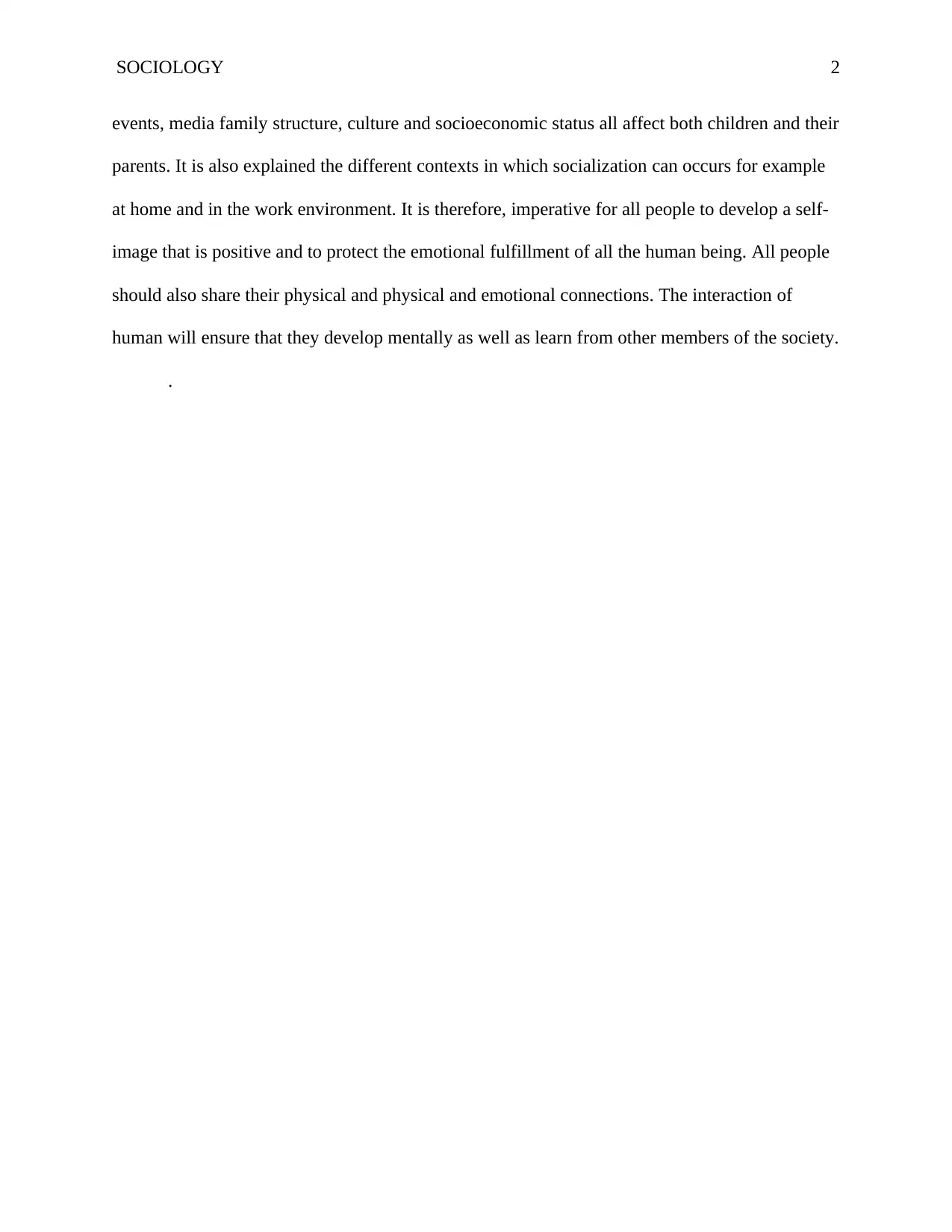
SOCIOLOGY 2
events, media family structure, culture and socioeconomic status all affect both children and their
parents. It is also explained the different contexts in which socialization can occurs for example
at home and in the work environment. It is therefore, imperative for all people to develop a self-
image that is positive and to protect the emotional fulfillment of all the human being. All people
should also share their physical and physical and emotional connections. The interaction of
human will ensure that they develop mentally as well as learn from other members of the society.
.
events, media family structure, culture and socioeconomic status all affect both children and their
parents. It is also explained the different contexts in which socialization can occurs for example
at home and in the work environment. It is therefore, imperative for all people to develop a self-
image that is positive and to protect the emotional fulfillment of all the human being. All people
should also share their physical and physical and emotional connections. The interaction of
human will ensure that they develop mentally as well as learn from other members of the society.
.
⊘ This is a preview!⊘
Do you want full access?
Subscribe today to unlock all pages.

Trusted by 1+ million students worldwide
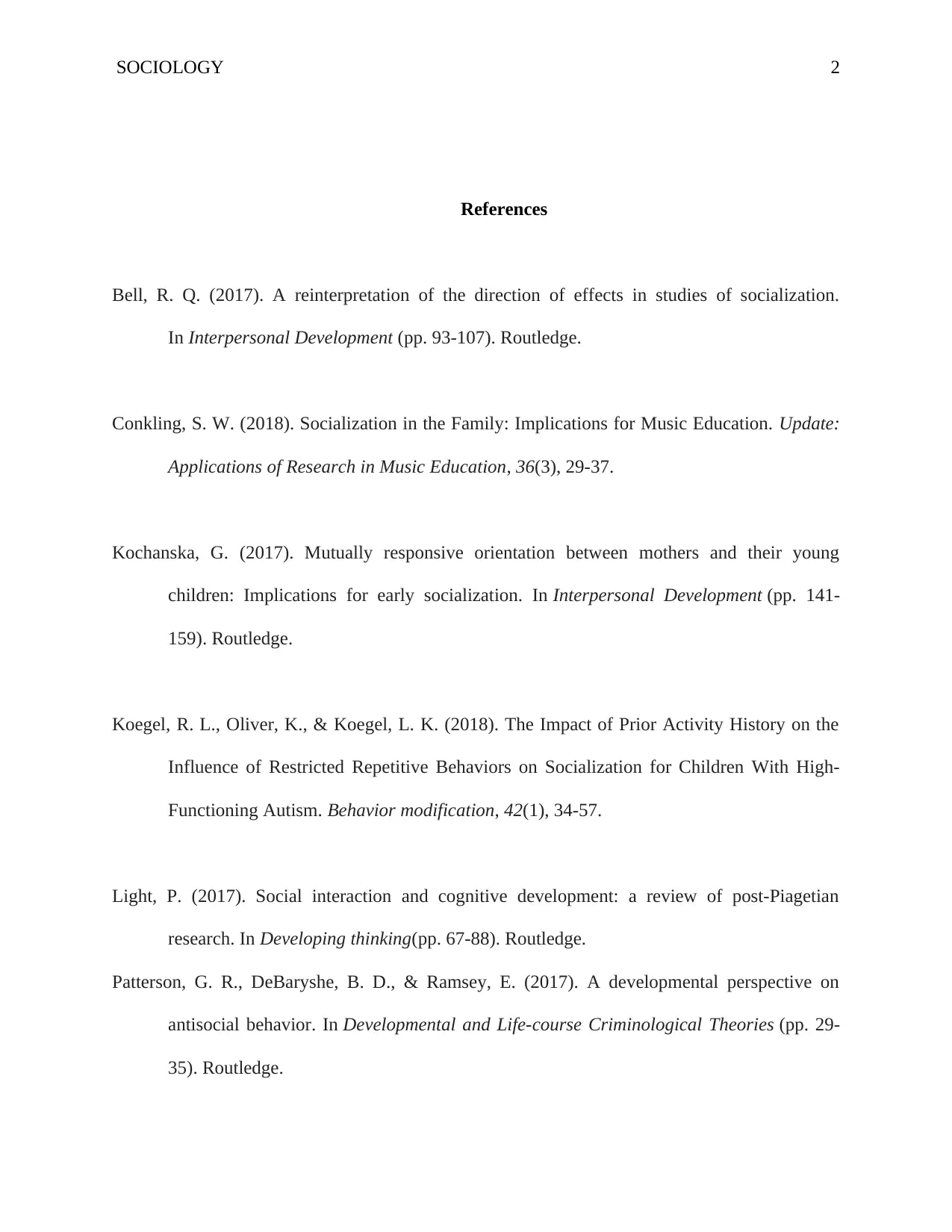
SOCIOLOGY 2
References
Bell, R. Q. (2017). A reinterpretation of the direction of effects in studies of socialization.
In Interpersonal Development (pp. 93-107). Routledge.
Conkling, S. W. (2018). Socialization in the Family: Implications for Music Education. Update:
Applications of Research in Music Education, 36(3), 29-37.
Kochanska, G. (2017). Mutually responsive orientation between mothers and their young
children: Implications for early socialization. In Interpersonal Development (pp. 141-
159). Routledge.
Koegel, R. L., Oliver, K., & Koegel, L. K. (2018). The Impact of Prior Activity History on the
Influence of Restricted Repetitive Behaviors on Socialization for Children With High-
Functioning Autism. Behavior modification, 42(1), 34-57.
Light, P. (2017). Social interaction and cognitive development: a review of post-Piagetian
research. In Developing thinking(pp. 67-88). Routledge.
Patterson, G. R., DeBaryshe, B. D., & Ramsey, E. (2017). A developmental perspective on
antisocial behavior. In Developmental and Life-course Criminological Theories (pp. 29-
35). Routledge.
References
Bell, R. Q. (2017). A reinterpretation of the direction of effects in studies of socialization.
In Interpersonal Development (pp. 93-107). Routledge.
Conkling, S. W. (2018). Socialization in the Family: Implications for Music Education. Update:
Applications of Research in Music Education, 36(3), 29-37.
Kochanska, G. (2017). Mutually responsive orientation between mothers and their young
children: Implications for early socialization. In Interpersonal Development (pp. 141-
159). Routledge.
Koegel, R. L., Oliver, K., & Koegel, L. K. (2018). The Impact of Prior Activity History on the
Influence of Restricted Repetitive Behaviors on Socialization for Children With High-
Functioning Autism. Behavior modification, 42(1), 34-57.
Light, P. (2017). Social interaction and cognitive development: a review of post-Piagetian
research. In Developing thinking(pp. 67-88). Routledge.
Patterson, G. R., DeBaryshe, B. D., & Ramsey, E. (2017). A developmental perspective on
antisocial behavior. In Developmental and Life-course Criminological Theories (pp. 29-
35). Routledge.
Paraphrase This Document
Need a fresh take? Get an instant paraphrase of this document with our AI Paraphraser
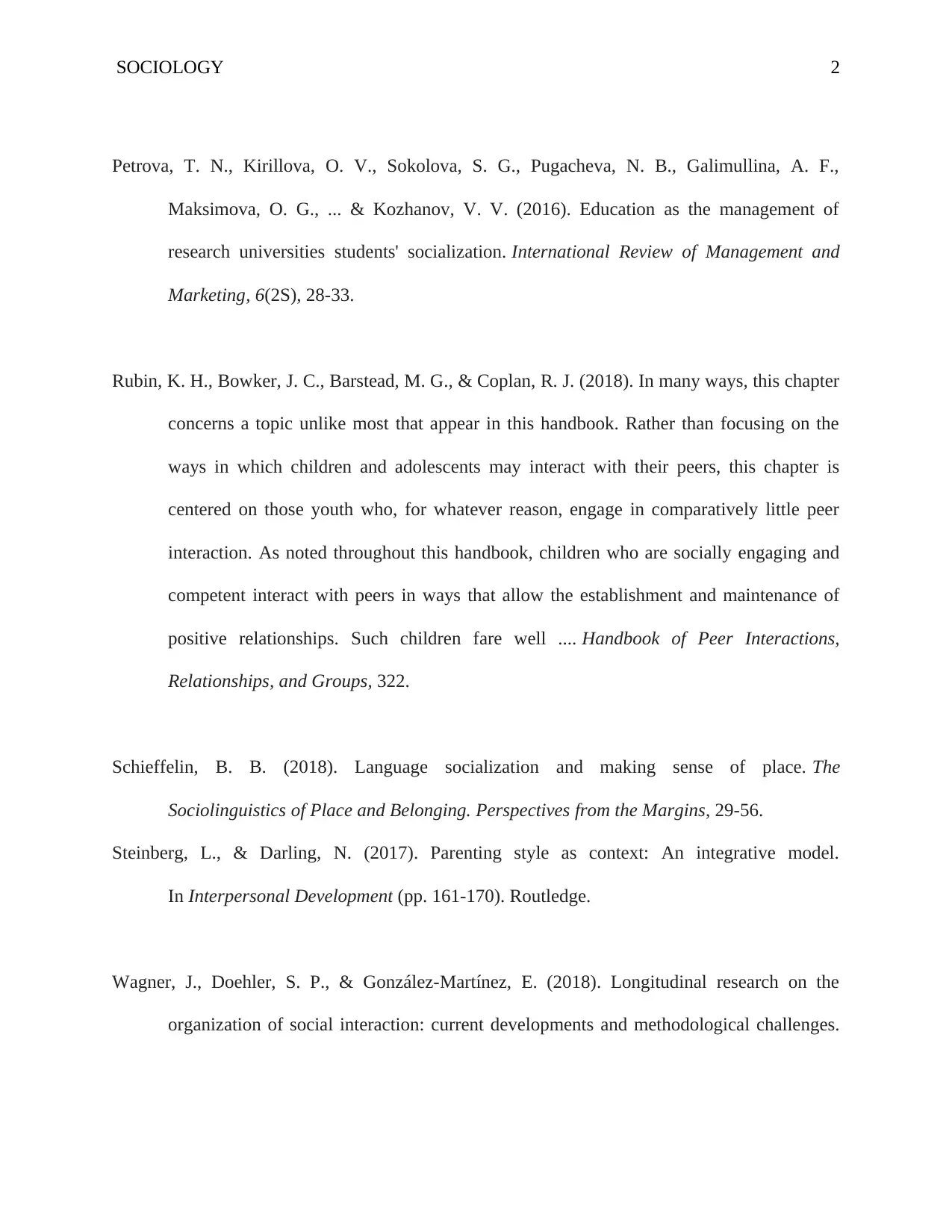
SOCIOLOGY 2
Petrova, T. N., Kirillova, O. V., Sokolova, S. G., Pugacheva, N. B., Galimullina, A. F.,
Maksimova, O. G., ... & Kozhanov, V. V. (2016). Education as the management of
research universities students' socialization. International Review of Management and
Marketing, 6(2S), 28-33.
Rubin, K. H., Bowker, J. C., Barstead, M. G., & Coplan, R. J. (2018). In many ways, this chapter
concerns a topic unlike most that appear in this handbook. Rather than focusing on the
ways in which children and adolescents may interact with their peers, this chapter is
centered on those youth who, for whatever reason, engage in comparatively little peer
interaction. As noted throughout this handbook, children who are socially engaging and
competent interact with peers in ways that allow the establishment and maintenance of
positive relationships. Such children fare well .... Handbook of Peer Interactions,
Relationships, and Groups, 322.
Schieffelin, B. B. (2018). Language socialization and making sense of place. The
Sociolinguistics of Place and Belonging. Perspectives from the Margins, 29-56.
Steinberg, L., & Darling, N. (2017). Parenting style as context: An integrative model.
In Interpersonal Development (pp. 161-170). Routledge.
Wagner, J., Doehler, S. P., & González-Martínez, E. (2018). Longitudinal research on the
organization of social interaction: current developments and methodological challenges.
Petrova, T. N., Kirillova, O. V., Sokolova, S. G., Pugacheva, N. B., Galimullina, A. F.,
Maksimova, O. G., ... & Kozhanov, V. V. (2016). Education as the management of
research universities students' socialization. International Review of Management and
Marketing, 6(2S), 28-33.
Rubin, K. H., Bowker, J. C., Barstead, M. G., & Coplan, R. J. (2018). In many ways, this chapter
concerns a topic unlike most that appear in this handbook. Rather than focusing on the
ways in which children and adolescents may interact with their peers, this chapter is
centered on those youth who, for whatever reason, engage in comparatively little peer
interaction. As noted throughout this handbook, children who are socially engaging and
competent interact with peers in ways that allow the establishment and maintenance of
positive relationships. Such children fare well .... Handbook of Peer Interactions,
Relationships, and Groups, 322.
Schieffelin, B. B. (2018). Language socialization and making sense of place. The
Sociolinguistics of Place and Belonging. Perspectives from the Margins, 29-56.
Steinberg, L., & Darling, N. (2017). Parenting style as context: An integrative model.
In Interpersonal Development (pp. 161-170). Routledge.
Wagner, J., Doehler, S. P., & González-Martínez, E. (2018). Longitudinal research on the
organization of social interaction: current developments and methodological challenges.
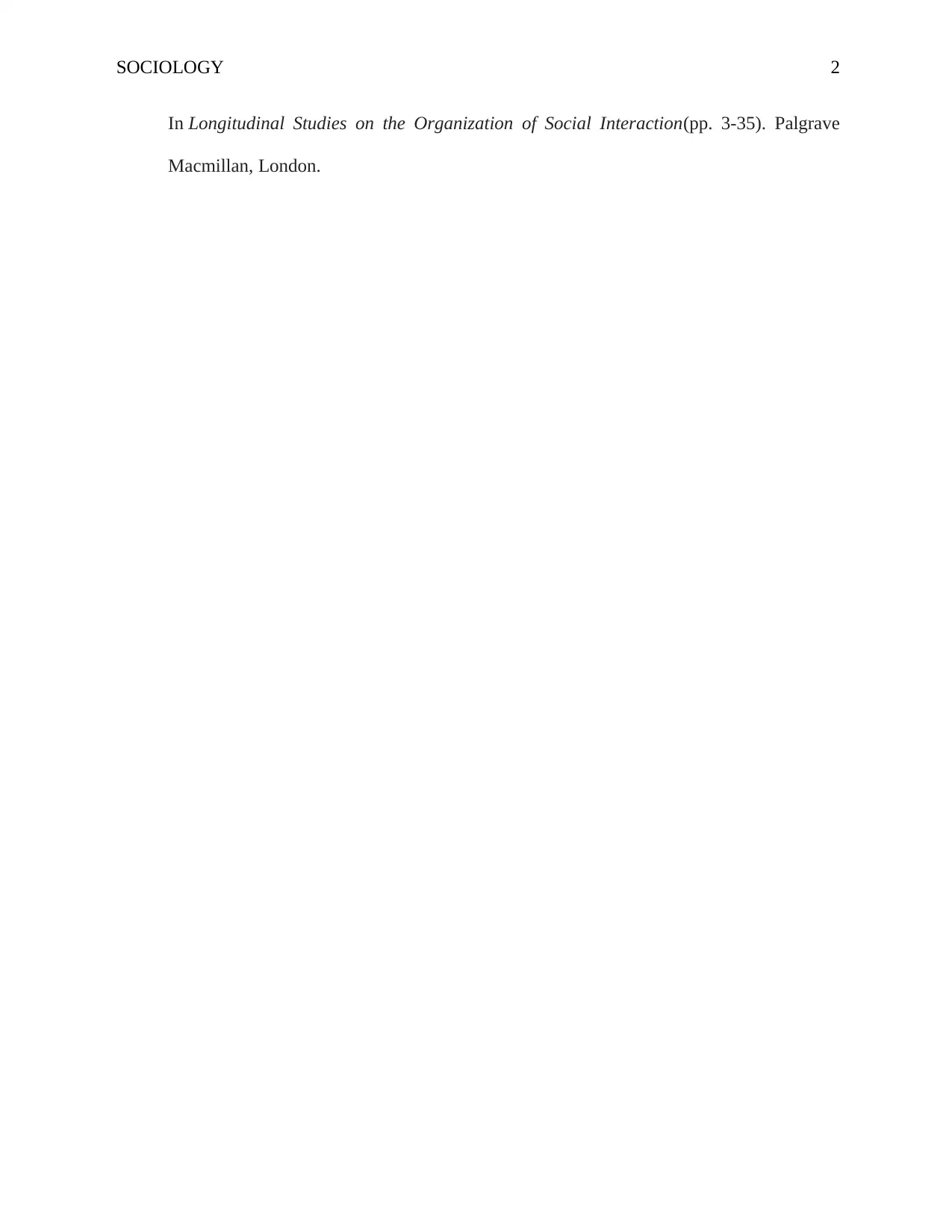
SOCIOLOGY 2
In Longitudinal Studies on the Organization of Social Interaction(pp. 3-35). Palgrave
Macmillan, London.
In Longitudinal Studies on the Organization of Social Interaction(pp. 3-35). Palgrave
Macmillan, London.
⊘ This is a preview!⊘
Do you want full access?
Subscribe today to unlock all pages.

Trusted by 1+ million students worldwide
1 out of 9
Related Documents
Your All-in-One AI-Powered Toolkit for Academic Success.
+13062052269
info@desklib.com
Available 24*7 on WhatsApp / Email
![[object Object]](/_next/static/media/star-bottom.7253800d.svg)
Unlock your academic potential
Copyright © 2020–2026 A2Z Services. All Rights Reserved. Developed and managed by ZUCOL.





